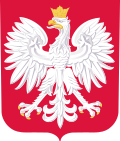You can help expand this article with text translated from the corresponding article in Polish. (August 2017)Click [show] for important translation instructions.
|
This article needs additional citations for verification .(July 2007) |
Social Democracy of the Republic of Poland Socjaldemokracja Rzeczypospolitej Polskiej | |
|---|---|
 | |
| Leader | Aleksander Kwaśniewski |
| Founded | 28 January 1990 [1] |
| Dissolved | 15 April 1999 |
| Preceded by | Polish United Workers' Party (de facto) |
| Merged into | Democratic Left Alliance |
| Headquarters | Warsaw |
| Ideology | Social democracy Post-communism |
| Political position | Centre-left |
| National affiliation | Democratic Left Alliance (1990–1999) |
| International affiliation | Socialist International (1996–1999) |
| Colours | Red |
 |
|---|
Social Democracy of the Republic of Poland (Polish : Socjaldemokracja Rzeczypospolitej Polskiej, SdRP) was a social-democratic political party in Poland created in 1990, shortly after the Revolutions of 1989. The party was the main party of the successor parties to the Polish United Workers' Party (PZPR).
Contents
Among the creators and leading figures of SdRP were the former Polish president Aleksander Kwaśniewski, former speaker of the Sejm Józef Oleksy and former Prime Minister Leszek Miller. The SdRP's name was a paraphrase of the late 19th century Social Democracy of the Kingdom of Poland and Lithuania (SdKPiL), a party which was the direct predecessor of the Communist Party of Poland. [2]
On 15 April 1999, the SdRP was folded into the Democratic Left Alliance. [3]